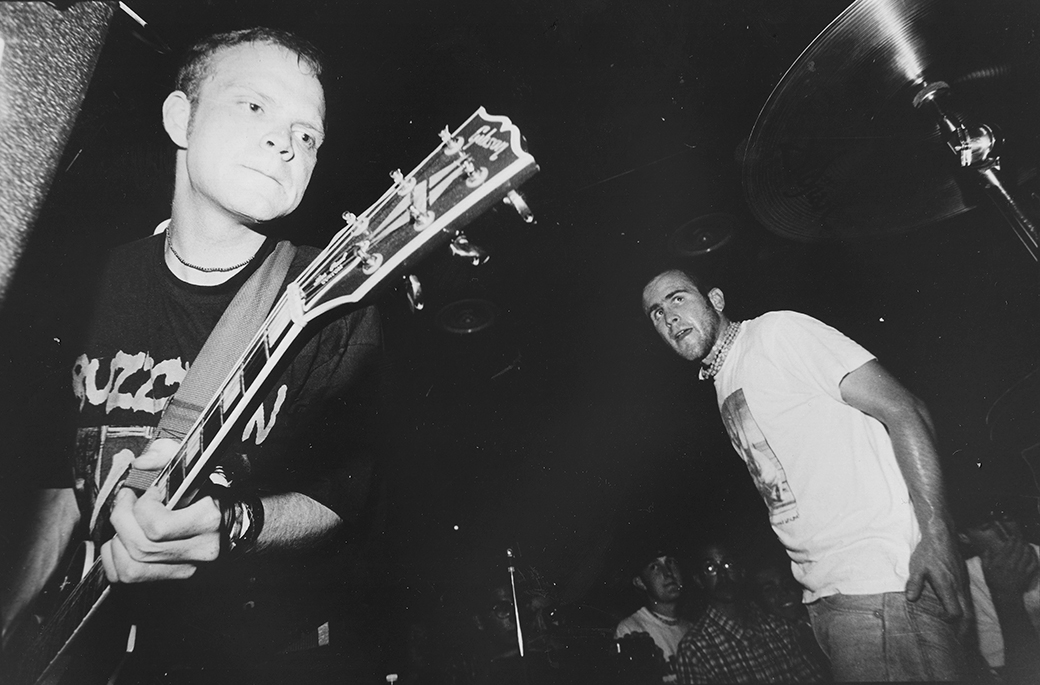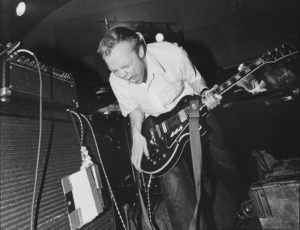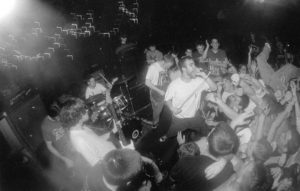
English lecturer reflects on past in punk music, creative writing
Punk rock may be part of his past, but English lecturer Duncan Barlow still stays true to his punk ideals as an author, publisher and professor.
Barlow teaches creative writing and publishing at USD and has written a handful of books, including “The City, Awake,” “Of Flesh and Fur” and “Super Cell Anemia.” He’s also the publisher at Astrophil Press and the managing editor of the South Dakota Review.
He said his works of fiction are inspired by issues he deals with in life.
“Typically I’m looking at sort of metaphysical issues that I wrestle with or philosophical issues that I wrestle with and kind of explore them through the realm of fiction,” he said.
Although he grew up with dyslexia, Barlow said the challenge of language is what inspired him to start writing.
“When I was a child, around sixth grade they kind of realized I could barely read or write,” he said. “I try to focus as much as possible and I try to bring as much as possible to my students a sense of exactitude in writing, and understanding that language is not arbitrary. No matter how wonderful a world we create, we have to focus on the precision within a language that we’re using.”
Brendan Gayken, a junior media & journalism major and the music director for Coyote Radio, met Barlow in his publishing class. Gayken said the class was fun under Barlow’s guidance.
“There was a lot of creative license in the class, which I liked. He set good parameters and was a good guiding hand through the whole thing,” Gayken said. “Without the proper direction, it could’ve just been terrible, so I was glad that he was the one doing it.”
Gayken said he’s seen Barlow both attend and play shows at Total Drag, a local record store and concert venue in Sioux Falls. They share a common interest in music.
“I look up to Duncan quite a bit just because he was in a lot of punk projects in the late 80s and 90s,” he said. “It’s cool to see a professor with that sort of punk background in music be able to thrive in a professional setting with that type of experience. He’s just a good guy to talk to and it makes you feel good to see someone that you’d like to emulate in some ways.”
Punk music
Barlow was interested in punk music from a very early age for its expressive, political nature and what he said was a “good community of supportive people.”
“As a boy who was perceived as dumb because of my learning disability, I had a lot of anxiety and frustration. Punk just spoke to me in a way that other music didn’t,” he said. “It was not overly pretentious, it seemed political and it was pretty angry and that resonated with me.”
Barlow said the band that got him into punk was Black Flag.

“It wasn’t until I heard this band Black Flag that I was like okay, sign me up, this is my life,” he said. “I would just save my lunch money every week and walk down to this record store and buy a new record. I would take on summer jobs to buy more records. I was obsessed.”
In his sophomore year of high school, Barlow started the band Endpoint with some friends. He said that by his senior year, they had released two records and were going on tours.
“In high school I was driving out of state to play shows and by college, we were doing extensive tours and we had endorsements for companies,” he said. “It was a very weird thing because when I was a senior, we were already drawing a thousand people at a show which is just like a really weird thing to put a 17 year old in.”
Barlow said that two years later, in 1992, he and his bandmates were receiving calls from major labels “trying to find the next Nirvana.”
“We were not interested, we wanted to keep it independent, we didn’t see it as our future,” he said. “I’ve just always cared more about the music than I did whether or not it was popular.”
Some of Barlow’s most prominent bands include Endpoint, Guilt and By The Grace Of God, but he said he can’t remember all of the bands he’s played in. He’s played everything from folk, punk, noise, electronic and metal to indie, he said.
He remembers bands that would open for them at shows, such as At The Drive-In, AFI and Jimmy Eat World. He said he remembers Green Day before they became famous.
“We had a show with Green Day when nobody knew who they were, but they didn’t show up because they were drunk,” he said. “There was a lot of those bands that would go on to kind of be something. Nobody was looking to be famous. It just happens, I guess.”

Barlow said he’s looking forward to releasing a solo album under his name and going on another tour with his band By The Grace Of God for their forthcoming record “Above Fear.”
Skip Willman, an associate professor of English, knows Barlow through the department and said they’ve collaborated on music together and audio recording for one of Barlow’s books.
“I invited him over and he added some parts to a song I was working on with my band, and since then, I’ll occasionally take some of my stuff over to his place and get his thoughts on mixing and elements arranging,” he said. “He has invited me over to participate on his most recent solo album, just little parts, bass and guitar.”
Willman said he’s found Barlow’s stories fascinating.
“I think it’s incredibly interesting to know his background and some of the adverse conditions of his background to kind of do what he has done is pretty amazing,” Willman said. “He’s lived the life and stayed true to his ideals.”
Barlow said he’s more focused on his future rather than his past in punk.
“It was such a big part of my life, but it was also just my past. If you get me in the right mood, there’s a lot of crazy stories from those days that can come out when I’m being an old man telling stories,” he said. “I’m always more focused on what’s coming and what I want to do than what I did.”

